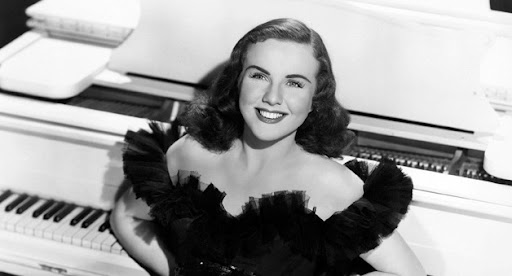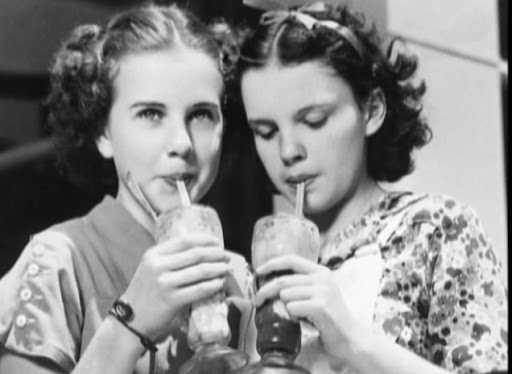Warning: This article discusses details and important plot points in the movie.
PlotRecovering from gun shot wounds, aptly named war correspondent, Vincent Bullitt (Melvyn Douglas), needs rest before returning overseas for further reports on European crises. His editor, Gilbert Fullerton (John Halliday) opens his home to Bullitt, where Fullerton’s teen-aged daughter, Alice (Deanna Durbin), becomes infatuated with their guest. Her childhood friend, Ken Warren (Jackie Cooper), considers Bullitt a personal and professional threat: Alice is oblivious to her friend’s love, and now feels too grown up to participate in a children’s musical production that Ken is directing.
Deanna Durbin's First Film Romance
The October 3, 1938 issue of Life Magazine hails That Certain Age as Deanna Durbin’s first romance. Now in her late teens, Ms. Durbin, like her character Alice, yearns for adulthood. “…I wanted to look glamorous,” Ms. Durbin says in her 1983 interview, “I couldn‘t wait to wear low cut dresses and look sultry.” The star had an uphill battle on that score, even in her later films.
Columnist Frank S. Nugent would address the star's maturation in reference to another Durbin picture, Three Smart Girls Grow Up (1939):
“A couple of books could be written on Miss Durbin's singular appeal, but none of them would contain the horrible epithet Universal's advertising staff fastened on the miss last week.Freedom indeed! Deprivation would seem to be a more appropriate word, according to Deanna Durbin. She found being typecast as Little Miss Fixit intolerably confining.
‘Glamorous’ was the word they dared employ and we haven't said a civil word to Universal since. It doesn't matter how the dictionary defines it….
We know what Hollywood means by glamour and we won't have our Deanna playing in the same category as Hedy, Marlene, Greta, Joan, Carole, Loretta, Merle and Tyronne (sic).
Glamour indeed! As if it had not been her very freedom from glamour, Hollywood style, that has endeared her to her millions. ”
Alice Wants The Freedom of Adulthood
In That Certain Age, the star takes a comic spin on these real life concerns. As Alice, Durbin plays a cloistered, lovelorn teenager ensconced in a palatial country estate, desperate to grow up. Alice spends plenty of time in the film confiding in her diary about Vincent Bullitt’s demeanor and gestures, which she eagerly believes are his signals to her of an impending love affair and marriage - her road to adulthood and liberty.
Alice admires her mother’s refinement, and envies her father’s autonomy. As a newspaper editor, Mr. Fullerton goes out of exurbia to the city every day to publish exciting stories from around the globe. But even Mr. Fullerton’s stimulating life is limited to paper. Vincent Bullitt has lived.
 |
| Life Magazine |
Both Alice and best friend Ken view world-weary Bullitt as the symbol of adventure far away from “this bit of Greensford called home.” Everyone at this time was focused on European movements and the distinct possibility of another world war. Headlines in the States - like those written by Bullitt - speak of political upheaval and death for many living abroad. The teens in this film want to travel and do something important, but their immaturity betrays them when referring to the world as “a playground” in those troubled times.
The adult characters observe Alice and Ken with amusement and long-suffering smiles, knowing the children do not fully appreciate the gravity of life. Bullitt tips his hat to the audience's state of mind when speaking wistfully of growing up in an idyllic town in Iowa: “It was a great world without any problems.” You can almost see people in the audience nodding in agreement when this piece of nostalgia is thrown in relief against the horrors of the times. The reporter, however, has forgotten the pangs of adolescent life.
 |
| Life Magazine |
Alice, filled with admiration for the mustachioed war correspondent, is oblivious to her own selfish and foolish behavior until the very end, which makes for many humorous moments.
- She appears to be riding a runaway horse so that Bullitt will rescue her. He does and they both land on the ground. “Where am I?,” she asks. “You‘re sitting on my chest,” he says.
- When Alice tells best friend Ken that she needs someone with whom to discuss personal matters, he’s confused, so she says goodbye to “Kenneth,” while condescendingly patting him on the arm. “It’s been lovely talking to you," she sighs.
- When Bullitt notices a lovesick look in her eye, he assumes she’s in love with Ken. She dramatically writes in her diary in heavy ink that because of he doesn't love her, the day is "Black Tuesday."
- She overhears Bullitt jokingly referring to her on the phone as his other woman, which, to her, affirms his undying love. Deanna Durbin is absolutely charming as she stammers, blushes and flies out of the room, elated.
- At Bullitt’s birthday party, a frustrated Alice defiantly tries on her first floor-length evening gown. In an hilarious sequence of scenes, our heroine sheds a light, juvenile, tea-length frock, (“I look like a bottle of milk in it!”), and dons one of her mother’s dark, strapless gowns, her hair in an updo. As she saunters lightly in a pair of heels, her mother insists that she return to the milk bottle dress immediately [echoing Nugent’s sentiments regarding Ms. Durbin‘s own burgeoning womanhood].
There are many films featuring a teen-aged girl’s infatuation with an older man. In these films, there’s usually a teen-aged boy sulking over his unrequited love for the girl. Boy gets a couple of scenes to display his dismay, but often he’s incidental. He shows up near the end, like a puppy waiting for scraps, hoping Girl will return to him after she’s become disenchanted with the older man.
Certain Age is remarkable in that it puts equal emphasis on both teens’ motivations, not just on that of the girl. It also allows Ken to move away from Alice, if not yet emotionally, then certainly physically. In order to step aside for the “better man,” Ken makes plans to leave town.
 |
| A Tale of Two Teens |
Due to Jackie Cooper’s level of fame, the screenwriters fleshed out the character more than usual. By this time, Cooper was a prolific actor who had been nominated for an Academy Award. [To this day, Cooper holds the record as the youngest male to be nominated for the Academy’s Best Actor Award. The film was Skippy (1931); he was 9 years old.] As with Deanna Durbin, Cooper would grow disenchanted with Hollywood and would later fight to make sure that his own children never entered the business as young performers.
Ken Attempts Maturity
Ken’s driving force - to secure some kind of relationship beyond best friends with Alice - is front and center when he‘s on the screen, but we also see his artistic aspirations, his home life, his interactions with brother and sister, how the family members work together on projects and how they respond when one of them (namely Ken) is depressed. Ken’s interactions with little sister Butch the Pest (Juanita Quigley) are especially charming, even though little Juanita shouts her lines during a quiet crisis point. [“Alice hates you, doesn‘t she?,” Butch yells. Ouch.]
The attempts to tell his childhood chum of his long-standing love are met with Alice’s distracted and enigmatic rhetoric about fire, romance and never telling “the one” about your feelings. What should a fellow do? The camera watches the back of Ken’s lone, pajama-clad figure as he writes a farewell note to Alice. You’re not sure that he isn’t writing a suicide note. He isn’t. Junior scoutmaster Ken is joining the Navy to see the world. Or rather, he contemplates it, wears a sailor’s cap and stuffs his belongings into a sack. But like Alice in her mother’s gown, he’s a kid playing dress up. Later he tosses aside his cap and drops the sack, abandoning a career about which he was never really serious. [Ken foreshadows Don (Robert Stack) in Nice Girl?(1941) who has a more resolute determination to join the Army after Jane (Durbin) chooses an older man.]
It is at the birthday party that Bullitt discovers Alice’s infatuation, which sends the story line crashing to its inevitable end. The grownups conspire to make Bullitt seem as distasteful as possible, but the only trick which works is declaring that Bullitt has a wife. His colleague Grace Bristow (Nancy Carroll), easily slides into the role and Alice instantly cannot stand the sight of Bullitt, much to Ken‘s elation. Alice declares she’s been a fool and rejoins the neighborhood playhouse. By the end Alice has grown a bit, but self-sacrificing Ken has matured much more.
More Information
The song “My Own,” which Alice sings at Vincent’s birthday party, was written by Jimmy McHugh and Harold Adamson, who had written a number of songs for Durbin. The song was nominated for an Academy Award. It lost to “Thanks for the Memories,” which Bob Hope sings in The Big Broadcast of 1938.
Stars: Deanna Durbin (Alice Fullerton), Melvyn Douglas (Vincent Bullitt), Jackie Cooper (Ken), Irene Rich (Mrs. Fullerton), Nancy Carroll (Grace Bristow), John Halliday (Mr. Fullerton), Jack Searl (Tony), Juanita Quigley (Butch, the Pest), Peggy Stewart (Mary Lee), Charles Coleman (Stevens), Grant Mitchell (Jeweler).
Gowns: Vera West
Director: Edward Ludwig
Producer: Joe Pasternak
Screenplay: Bruce Manning, Billy Wilder, Charles Brackett. Original story by F. Hugh Herbert
Songs: “My Own,”"You're as Pretty as a Picture," "That Certain Age" and "Be a Good Scout," music by Jimmy McHugh, lyrics by Harold Adamson; "Daisy Bell," Written by Harry Dacre; "Les Filles de Cadiz," music by Léo Delibes; "Aria from 'Romeo et Juliette'," music by Charles Gounod.
 |
| Life Magazine |































































